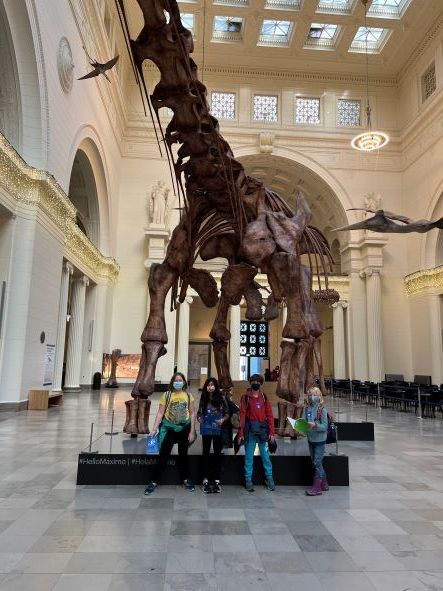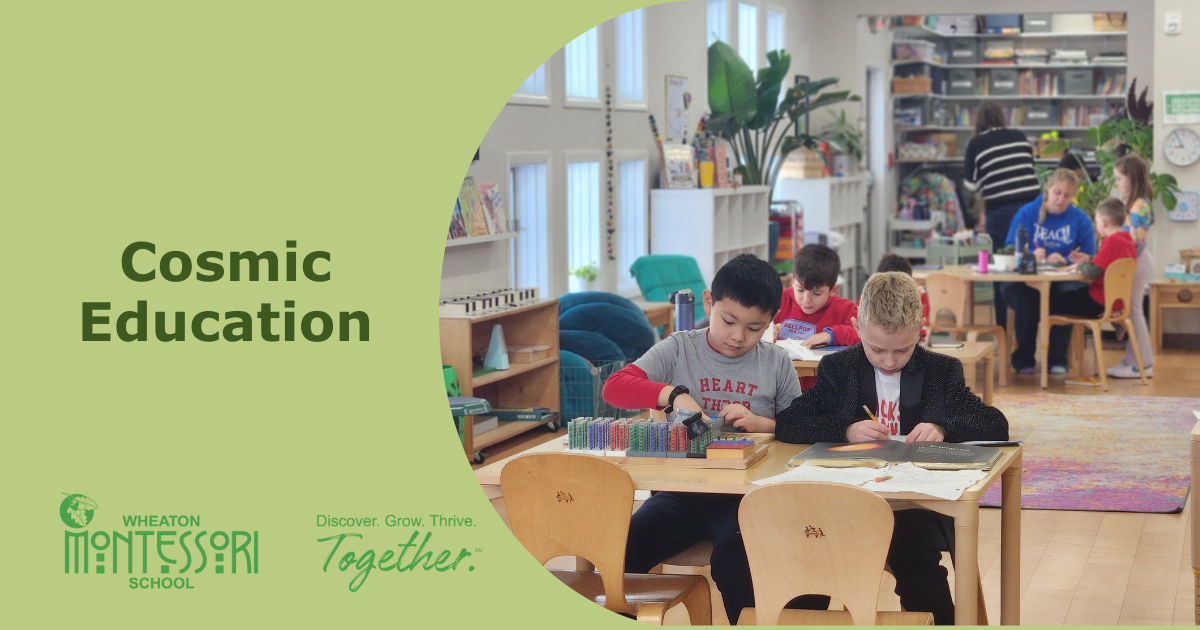

At the elementary level, children want to know the how and why of everything. As a result, they have a strong drive to explore the world beyond their immediate family and even their classroom or school. New interests compel elementary-age children to explore anywhere and everywhere! Plus, they are creating their ability to function in society. In order to achieve this, our elementary children need to acquire new skills.
One of the ways our elementary program helps six- to twelve-year-olds develop these new skills is through something called “going out.” Dr. Maria Montessori developed the idea of “going out,” both literally and figuratively. She recognized how, developmentally, elementary-age children needed to go out the door of the classroom and that the door should open into the wider world.
What is Going Out?
Imagine a group of two, three, or four children have been studying something in the classroom. They have exhausted all of the resources in the class and are eager to learn more. For example, a group of children may have learned about falcons. They want to interview a falconer and see some falcons up close. Or maybe a couple of students have been interested in mice, so they visit the local pet store to learn about the care of rodents. Students who just researched the Titanic may discover a nearby museum with a display about the Titanic, so they arrange a visit. Children learning about a period in history might visit a local theater’s costume shop to find clothing from that time period and recreate what someone would wear. The options are endless.
Purposes of Going Out
This small group experience serves elementary children’s need for independence, collaboration, and experience. They need new opportunities for intellectual stimulation. They are curious to learn more. They want to learn everything about the universe, and the universe won’t fit into our classrooms!
Elementary children need to be social and collaborate. In preparing for a “going out” experience, students work together in authentic and meaningful ways. In the classroom, they share resources, make group decisions, delegate and divide labor, take responsibility, and celebrate each other’s success. Conflict can arise, but this is a necessary and important part of their work. With support, children practice respectful problem-solving. After all this practice, they are ready to apply these skills outside of the classroom through their “going out” experiences.
“Going out” trips also require a new level of self-discipline. Children must make decisions and take action. To have a successful outing, they must organize their thinking, themselves, and each other. Students also must demonstrate a high level of responsibility, as individuals and as a group.
Different than a Field Trip
Although field trips are important and delightful, they are different than the “going out” experience. Field trips involve the entire class and are often planned and executed by an adult. The “going out” trip involves a small group of children who want to learn more about something they are studying or investigating. Those children are then responsible for all of the logistics of the “going out” trip. The outing is conceived, planned, organized, and carried out by this small group of children on a mission to learn more.
The responsibility for setting up a “going out” experience requires a variety of skills ranging from letter writing, sending emails, filling out forms, making and confirming appointments, finding transportation, reading schedules, budgeting for the day, making phone calls, speaking to adults outside the school community, using electronics respectfully, packing supplies, and following up with acknowledgments or thanks.
Sometimes children may need little mini-lessons about expectations and decorum related to their “going out” — how to enter a theater, how to conduct an interview, how to write a thank you note, how to show you are listening, how to pay an admissions fee, etc. These are vital skills that help our children prepare for how they will enter society.
A Community Effort
A successful “going out” program requires the support of the whole school community and the community at large. Sometimes parents or school staff offer to transport children. Being a “going out” driver is very different than being a field trip chaperone. A “going out” driver relies upon the children to share, among other things, details like admission costs (if any), hours of operation, directions, and where to park. If students have neglected to check the hours of the place they are visiting, and they arrive to find the doors locked, the driver might need to wait through some on-site problem solving and suggestions from the children about what to do next. This requires a great deal of adult self-restraint and an understanding of the aims of the program.
Going out affords children opportunities to tackle challenges and ponder expectations. They want to be capable and know what successful entry into society requires. When they familiarize themselves with the rules, they feel more secure in the world. Over time, as children develop connections and relationships out in the greater community, they also pave the way for future “going out” trips.
Support at Home
The spirit of “going out” can be supported at home, too! Think about the various activities folded into our daily routines and how our children can assume some ownership or responsibility. For example, going to the grocery store can become its own “going out” experience. Part of the preparation could be sitting with our children to peruse the weekly sale flier and plan menus for the week ahead. Children can write a list of what to buy and even estimate how much it will cost or try to work within a predetermined budget. Before leaving for the store, they can gather what is needed: reusable bags, the shopping list, snacks so no one shops hungry, etc. Or perhaps a recent weekend hike sparks questions and curiosity about a particular subject, like rockslides or mushrooms. Children can visit their local library, talk with the librarian about their interests, and check out or request resources.
Elementary children are capable of so much, physically and mentally. Going out acknowledges their potential and offers keys for our students to unlock new experiences and step into the wonderful world beyond the school. The best part? Not only does the “going out” experience meet elementary students’ developmental needs, it also promotes a future full of good citizenship and responsible community members.
To see this work in action, please schedule a tour. Our doors are always open!


